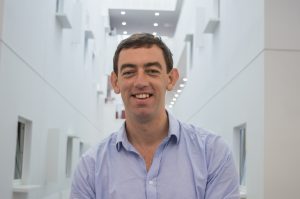 Dr Rory Horner is an economic geographer and Lecturer, ESRC Future Research Leader and Hallsworth Research Fellow at GDI. He is originally from Ireland and holds a PhD in Geography from Clark University in the United States.
Dr Rory Horner is an economic geographer and Lecturer, ESRC Future Research Leader and Hallsworth Research Fellow at GDI. He is originally from Ireland and holds a PhD in Geography from Clark University in the United States.
What is the current focus of your research?
My research looks at globalisation, trade and the industrial development of the pharmaceutical industry, particularly the production and trade of generic medicines in the global South. I look at how and why production patterns emerge, and which ones under which conditions could improve social and health outcomes.
Currently, my specific focus – supported by an ESRC Future Research Leader Award (2016-2019) – is on Indian pharmaceutical companies and their engagement with Sub-Saharan Africa. I am initially trying to shine a light on the dynamics of how the value chain operates, while considering some broader issues related to industrial development and health. Indian medicines are known to many as the “pharmacy to the developing world” because of the large volume of supply at a relatively lower cost than elsewhere. For some, these imports create a health dependence issue for developing countries, which is being combatted by a push for local production across much of Sub-Saharan Africa. A big current debate questions whether developing countries should domestically produce as much of their own medicines as possible or should the pharmaceuticals supply largely come from only large developing countries (such as India or China) or even Europe or North America? And which supply may be better for public health?
What is the biggest hurdle in the system?
The first is that the whole system is quite opaque and there is relatively little evidence available on the dynamics of the pharmaceutical industry in this context. Policymakers need this evidence to make decisions that are actually based on a concrete understanding of the dynamics – right now, the picture is far too fragmented.
Policy coordination is another big issue. On a national level, different aspects of the pharmaceutical industry fall under the different ministries, creating competing priorities or at least some disagreement. In South Africa, for example, there is debate between the relevant departments for industry and health: the first would like to promote South African manufacturers but the latter generally finds that it is more cost effective to buy the medicines it needs from India. The counter argument from the Department of Trade and Industry is that the longer term health outcomes are better if South African manufacturers are promoted to claim more domestic control over medicine supply. Of course, the dynamics between the different stakeholders are different depending on the country in question, but most are complex.
Why is this ESRC Future Research Leader research project important?
India is currently sending a large volume of medicines to developing countries, and there are claims made that this benefiting all parties concerned. But is that really the case? From the India angle, we need to trace out how “India’s pharmacy to the developing world” actually plays out. Does it really function the way it is perceived and is it really a win-win situation where India and people elsewhere in the Global South (from consumers to patients) all benefit?
The other angle is to look at the dynamics in the African countries, where the issues centre around local production, the effects of the dependence on imported, and the potential situation of health insecurity on one side, but also the potential health benefit of large volumes of relatively lower-cost medicines on the other side. For countries that have had smaller regulatory capacities to govern what drugs are imported, locally produced or how they are marketed and sold, who is keeping an eye on quality? All of these issues have potential significance for social and health outcomes for millions of people.
Finally, pharmaceuticals are an under-researched industry for development. I recently wrote a paper on why pharmaceuticals are important for development theory – basic development courses will frequently talk about the natural resource curse or labour standards in textile industry, but rarely delve into the pharmaceutical industry, which has a lot of broad lessons for students and researchers on the balancing act between promoting industrial development while delivering optimal social and health outcomes.
How does your work address global inequalities, one of The University of Manchester’s research beacons?
In two distinct ways. Firstly, access to medicines is a huge global inequality. Most developing countries don’t have health insurance systems, and certainly not of the kind that you find in the UK. This means that most people rely on their own private expenditure to pay for their medicines. So, the price of those medicines directly affects millions – and not just whether the medicine is cheap, but is it of the same quality and will it treat just as effectively as the pricier versions? My research tries to look at the underlying industrial mechanisms that eventually determine price and access to medicines, understanding the economic and wider social, political and health dimensions of development through that.
Secondly, between different countries, there’s huge variation in the price of medicines and in the underlying capacity to produce medicine. Different countries find themselves in very different bargaining positions when dealing with global donors or setting trade policies related to pharmaceuticals, for example. A country that is dependent on multinationals from Europe and North America for their medicines may find it difficult to implement policies in favour of generic medicines. There is also a clear North/South divide on critical patent protection issues that could create significant obstacles for the supply of generic medicines.
 What is your favourite thing about GDI? Or what do you enjoy the most?
What is your favourite thing about GDI? Or what do you enjoy the most?
The international environment and context: both the student body and the colleagues I work with, who come from many different countries and backgrounds. We are also international in terms of outlook and orientation – there is broad support and interest for globally oriented teaching and research that involves fieldwork all over the world.
Also, the connectivity: there are so many opportunities to engage with different types of networks and colleagues, from workshops to high-profile guest lecturers. You feel well connected to the development studies and policy worlds, and in a good place to make new and relevant connections when working here.
What advice would you give to a PhD student?
It’s important to make sure that you’re producing tangible outputs (from papers to public engagement), but it isn’t all about the thesis: a PhD is a professional training that should provide you the basic skill set that you can build up as you grow as a researcher and teacher.
Who is your development hero?
Going by my EndNote files, probably Peter Evans and Gary Gereffi. The first has done a huge amount of work on the global economy, the latter on global value chains – but both started out doing research on pharmaceuticals! The shared interest in pharmaceuticals is coincidental though, I really enjoy and find relevance in all of their work. If I was pressed to choose one, it might be Evans, who wrote a pivotal book about the developmental state and really challenged the idea that the state didn’t matter for development.
What do you do when you’re not busy with research?
I used to row competitively but fieldwork cut into my training schedule. I still row, cycle, and am generally outside doing some kind of sport. Running is a favourite no-equipment option in the field!
